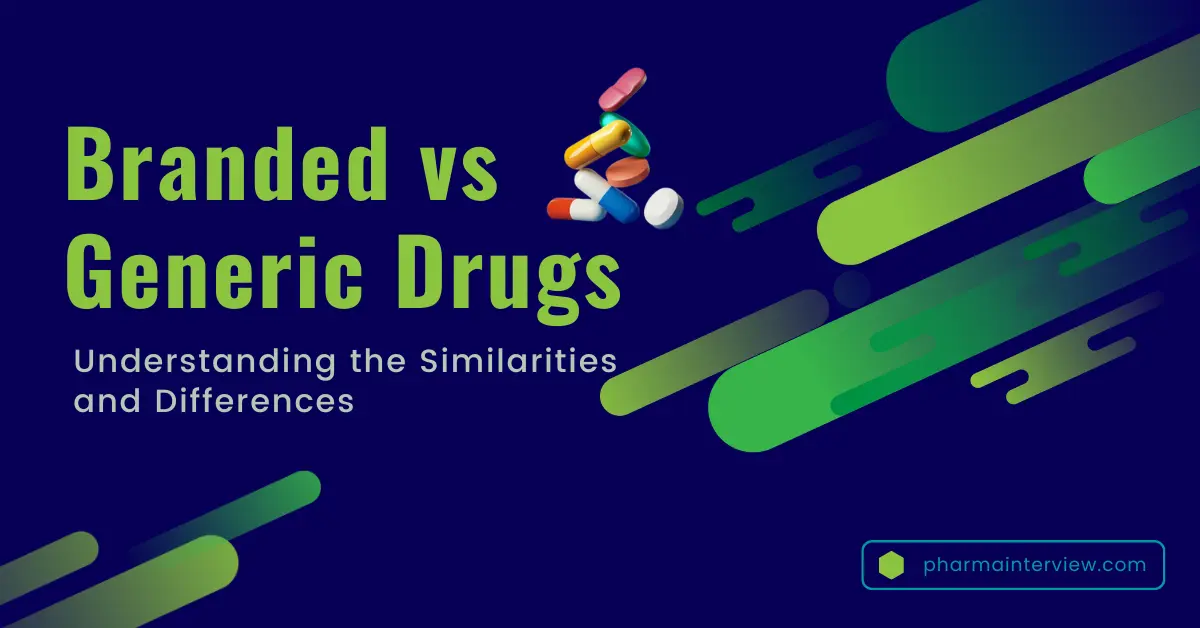In this blog post, we will discuss the differences between branded and generic drugs. While both types of drugs serve the same purpose, both are almost the same I can say 99 % same. However there are certain factors that set them apart. We will explore the similarities and differences between the two and understand how generic drugs are developed to be equivalent to their branded counterparts.

Key takeaways:
- Generic and brand-name drugs work the same only name is different.
- According to the FDA, generic drugs are just as effective as their branded competitor.
- Generic name drugs are mostly 80% to 85% less costly than branded drugs.
- During development of branded drugs, extensive research and development, pre-clinical study (Animal study), clinical studies are mandatory, where as in generic drug registration it is not required only need to perform bioavailability and bio-equivalence study (BABE study).
What is Branded Drugs ?
Branded drugs are the original products that are developed by pharmaceutical companies. They undergo extensive research and development before being introduced into the market. Branded drugs are often more expensive than generic drugs due to the costs associated with research, pre-clinical study, clinical trials, and marketing. However, they are considered to be reliable and effective in treating various medical conditions.
Branded name also called as a innovator, proprietary drug product, reference product, first marketed product and investigational new drug (IND).
What is the Generic Drugs ?
Generic drugs are the copies of branded drugs that are produced once the patent for the branded drug expires. These drugs contain the same active ingredients as the branded drugs and are required to meet the same safety and efficacy standards. Generic drugs are more affordable compared to branded drugs, making them accessible to a larger population or the common man. Generic drugs are equivalent to the branded drug or innovator.
The Generic drugs also called as a non-innovator, non-proprietary drugs or abbreviated new drug (ANDA). The Generic drugs is allowed to sale only after the patent of original drug expires.
Similarities between Branded and Generic Drugs
- Active Ingredients: Both branded (innovator) and generic drugs contain the same active ingredients, ensuring that they have the same therapeutic effect.
- Dosage Form: Whether it is a tablet, capsule, or any other form, both branded and generic drugs have the same dosage form.
- Strength: The strength of the active ingredient in both branded and generic drugs is the same.
- Route of Administration: The method of administration, such as oral or topical, is the same for both types of drugs.
- Quality and Safety: Both branded and generic drugs undergo rigorous quality control measures to ensure their safety and efficacy.
- Therapeutic Effect: The therapeutic effect of both branded and generic drugs is the same, as they work to treat the same medical conditions.
Differences between Branded and Generic Drugs
- Price: Branded drugs are often more expensive than generic drugs due to the costs associated with research and development. Generic drugs, on the other hand, are more affordable and accessible to a wider population. if suppose, the price of branded drugs is 10 rupees per tablet. Generic drug is only two rupees, that’s why most of the doctors are writing a prescription of generic drugs, it’s affordable to the common man also, however If cost is not your concern then you can be go for a brand.
- Excipients: Excipients are inactive ingredients present in the drug formulation. Branded and generic drugs may differ in terms of the excipients used, such as binding agents, disintegrating agents, preservatives, and coloring agents.
- Size and Shape: The size and shape of the tablets or capsules may vary between branded and generic drugs.
- Packaging: Branded and generic drugs may have different packaging designs, the container closing system and labeling.
- Manufacturing Methodology: The manufacturing processes for branded and generic drugs may differ, but both are required to meet the same quality and safety standards.
- Pre-Clinical Study : Pre-clinical studies are compulsory during new drug development of innovator. Before performing clinical study on human being, extensive pre-clinical study on animals required. Pre-Clinical studies means study of safety, efficacy, therapeutic action, absorption, distribution and metabolism on animals. However in case of generic drugs registration pre-clinical study is not mandatory, only need to perform bioavailability and bio-equivalence study (BABE study).
- Registration: NDA (New Drug Application) is required incase of filling of branded drugs to regulatory department, whereas during generic drug registration Abbreviated New Drug Application (ANDA) application is required.
Conclusion
In conclusion, branded (innovator) and generic drugs have similarities in terms of active ingredients, dosage form, strength, route of administration, quality, safety, and therapeutic effect. However, they differ in terms of price, excipients, size and shape, packaging, and manufacturing methodology. Generic drugs provide an affordable alternative to branded drugs, making them accessible to a larger population. It is important to consult with healthcare professionals to determine the most suitable option for individual medical needs.
Related articles
- Examples of brand and generic drugs
- Concept of generic generic product development.
People also read :
- 21 CFR Part 211 – cGMP guidelines for Finished pharmaceuticals
- 21 CFR guidelines for pharmaceuticals
- Top 10 most effective root cause analysis investigation tools
- What is root cause analysis ?
- Change Control Management in pharmaceutical industry
- Handling of deviation in pharma industry
- Dissolution test for solid dosage forms
- ALCOA Plus 9 Principles for Data Integrity